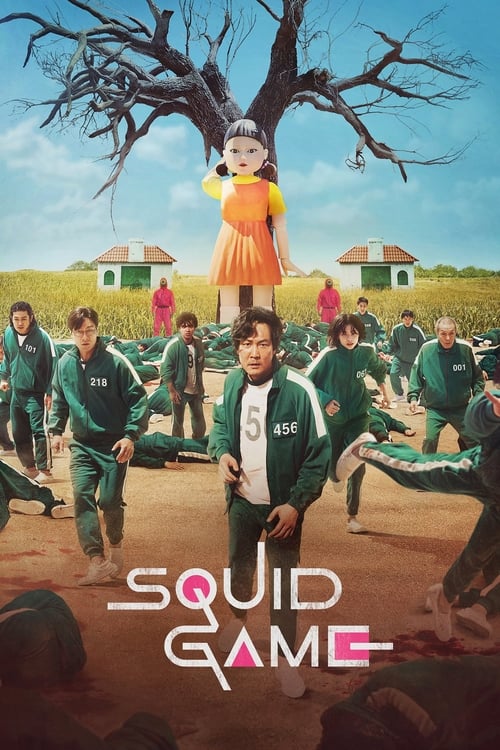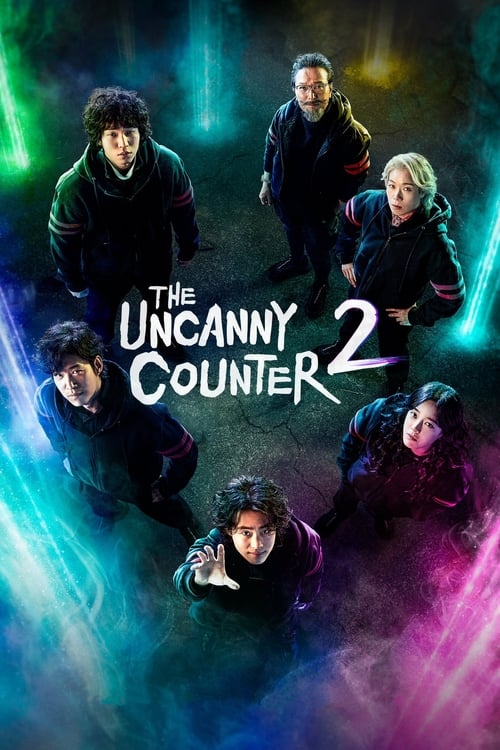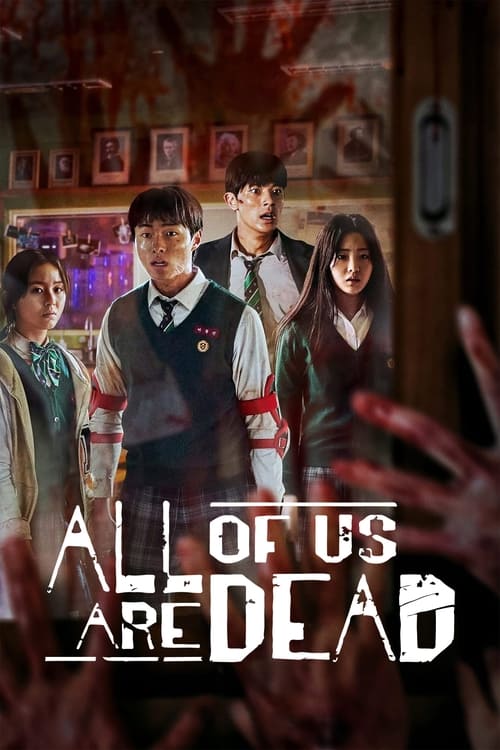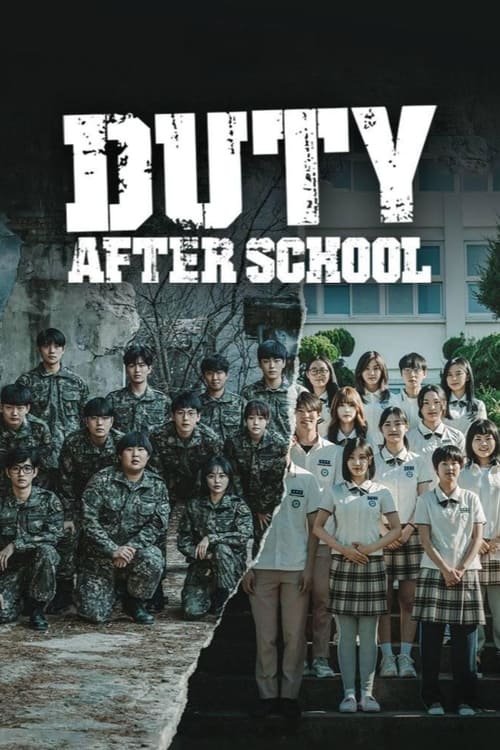
Ask Your Own Question
What is the plot?
Seong Gi-hun, a divorced father and gambling addict, is introduced as he struggles to make ends meet. He lives with his elderly mother and is deeply in debt, constantly being harassed by loan sharks. One day, while waiting for a train, he is approached by a man in a suit who offers him a chance to win money by playing a simple game of ddakji, a traditional Korean game. Gi-hun wins a few rounds but loses in the end, and the man gives him a business card with a number to call if he wants to participate in more games.
Desperate for money, Gi-hun calls the number and is picked up by a van along with other participants. They are taken to a remote island where they awaken in a large, mysterious facility. The participants, including Gi-hun, are stripped of their belongings and given green tracksuits to wear. They soon meet the masked guards and the Front Man, who explains that they will compete in a series of children's games for a chance to win a massive cash prize. However, they quickly learn that losing a game means death.
The first game is "Red Light, Green Light." The players must cross a finish line while avoiding detection by a giant doll that turns its head to catch any movement. As the game begins, panic ensues when players realize that those who fail to stop in time are shot dead. Gi-hun manages to survive, but many others are killed, including his childhood friend, Cho Sang-woo, who he later reunites with in the game.
After the first game, the remaining players are given a chance to vote on whether to continue or leave the game. Many choose to leave, including Gi-hun, who is deeply traumatized by the violence. However, once back in the real world, they find their lives unchanged and their debts still looming. Gi-hun, feeling guilty and haunted by the deaths, decides to return to the game, believing it to be the only way to escape his dire situation.
Back at the facility, the players are introduced to the second game, "Sugar Honeycombs," where they must carefully carve out shapes from a honeycomb candy without breaking it. Tensions rise as players struggle, and some resort to cheating. Gi-hun, with the help of his new ally, Ali Abdul, manages to succeed, but others, including a woman named Player 067, are not so fortunate and are eliminated.
The third game is "Tug of War," where teams must strategize to win. Gi-hun's team, which includes Sang-woo and Ali, faces off against a much stronger team. They use clever tactics to win, but the victory comes at a cost, as they witness the brutal elimination of the losing team.
As the games progress, alliances form and tensions rise. Gi-hun and his group grow closer, but they also face betrayal. The next game, "Marbles," forces players to pair up and play against each other. Gi-hun is paired with his childhood friend, Sang-woo, while Ali is paired with a woman named Player 240. The emotional stakes are high as they must outsmart each other to survive. Gi-hun ultimately wins by tricking Sang-woo, who sacrifices himself to save Gi-hun.
The final game is revealed to be "Squid Game," a childhood game that Gi-hun remembers. The remaining players are emotionally and physically exhausted. Gi-hun faces off against Sang-woo, who has become increasingly ruthless. In a tense and brutal confrontation, Gi-hun ultimately wins, but not before Sang-woo, in a moment of despair, takes his own life, leaving Gi-hun as the last survivor.
As Gi-hun emerges from the game, he is awarded the massive cash prize. However, he is left traumatized and haunted by the memories of the friends he lost. He struggles to reintegrate into society, grappling with the moral implications of his survival. In a final twist, Gi-hun discovers that the Front Man is his estranged brother, who has been orchestrating the games. Gi-hun vows to expose the organization behind the games, setting the stage for potential future confrontations.
What is the ending?
At the end of "Squid Game," Gi-hun wins the deadly games but is left traumatized and disillusioned. He discovers the true nature of the game and the identity of the Front Man. In a final confrontation, he chooses to confront the organizers rather than enjoy his winnings. The season concludes with Gi-hun vowing to change the system that led to the games, while the fate of other characters is revealed.
As the final game of Squid Game unfolds, the tension is palpable. Gi-hun, now the last remaining contestant, faces off against Sang-woo, his childhood friend turned rival. The game is a brutal version of the titular Squid Game, where the stakes are life and death. The two men, both emotionally and physically exhausted, engage in a fierce battle, fueled by desperation and the weight of their past.
In a heart-wrenching moment, Gi-hun manages to gain the upper hand. He has the chance to kill Sang-woo, but instead, he hesitates, reflecting on their shared history and the bond they once had. Sang-woo, in a moment of clarity, realizes the futility of their situation. He urges Gi-hun to live and take the prize money to help his daughter. In a tragic turn, Sang-woo takes his own life, leaving Gi-hun as the sole survivor.
With the games concluded, Gi-hun is awarded the prize money, a staggering sum that he initially believes will change his life. However, as he returns to the real world, the weight of his experiences begins to sink in. He is haunted by the memories of the friends he lost, particularly Ali and Sae-byeok, and the moral compromises he made to survive. The money feels tainted, a reminder of the horrors he endured.
In the final scenes, Gi-hun learns about the true nature of the game and the identity of the Front Man, who is revealed to be his brother. This revelation adds another layer of complexity to the narrative, as Gi-hun grapples with the implications of familial betrayal and the systemic issues that led to the creation of the games.
In a poignant moment, Gi-hun decides to confront the organizers of the games rather than indulge in his newfound wealth. He refuses to board a plane to reunite with his daughter, symbolizing his rejection of the life he once sought. Instead, he vows to expose the games and seek justice for the fallen contestants.
As the season closes, the camera lingers on Gi-hun's face, a mixture of determination and sorrow. He is a changed man, burdened by the knowledge of the darkness in humanity and the lengths people will go to for survival. The final shot reveals him turning back to face the camera, a silent promise to fight against the system that allowed such cruelty to exist. The fate of other characters, like the deceased contestants, serves as a haunting reminder of the cost of the games, leaving viewers with a sense of unresolved tension and the question of what justice truly means in a world driven by greed.
Is there a post-credit scene?
In "Squid Game," Season 1, there is no post-credit scene. The final episode concludes with a powerful and emotional climax, focusing on the aftermath of the deadly games and the fate of the main character, Seong Gi-hun. After the intense events, the series ends with Gi-hun making a pivotal decision that reflects his internal struggle and desire for change, leaving viewers with a sense of unresolved tension and contemplation about the themes of the show. The absence of a post-credit scene emphasizes the weight of the narrative and the impact of the choices made by the characters throughout the series.
What is the significance of the number 456 in Squid Game?
The number 456 is significant as it represents the main character, Seong Gi-hun, who is the last player to join the deadly games. It symbolizes his position as the underdog, as he is deeply in debt and struggling in life. The number also reflects the total amount of money at stake, 456 billion won, which becomes a driving force for all the players involved.
How does the character of Ali Abdul impact the story?
Ali Abdul, a Pakistani migrant worker, becomes a pivotal character in the story as he represents innocence and loyalty. His backstory reveals his desperate need for money to support his family, which resonates with many players. His bond with Gi-hun showcases themes of friendship and betrayal, especially when Gi-hun ultimately chooses to prioritize his own survival over Ali's, leading to a heartbreaking moment that highlights the moral dilemmas faced by the characters.
What role does the Front Man play in the Squid Game?
The Front Man is a mysterious figure who oversees the games and enforces the rules. His character is shrouded in secrecy, and he is revealed to be the brother of Hwang Jun-ho, a police officer investigating the games. The Front Man's motivations are complex, as he is both a ruthless enforcer of the deadly competition and a product of the same societal failures that led the players to participate in the games.
What is the significance of the game 'Red Light, Green Light'?
The game 'Red Light, Green Light' serves as the first deadly challenge in the Squid Game, introducing the players to the brutal reality of their situation. It symbolizes the loss of innocence, as a seemingly innocent children's game turns lethal. The emotional impact is profound as players realize that failure to comply results in death, setting the tone for the psychological horror that unfolds throughout the series.
How does the character of Kang Sae-byeok evolve throughout the series?
Kang Sae-byeok, a North Korean defector, evolves from a solitary and hardened individual to a more vulnerable character as she forms alliances with other players, particularly with Gi-hun and Ali. Her motivations are driven by her desire to reunite with her younger brother and escape her traumatic past. As the games progress, her emotional struggles and the weight of her choices become more pronounced, culminating in a tragic sacrifice that underscores the harsh realities of survival.
Is this family friendly?
"Squid Game" is not considered family-friendly due to its intense and graphic content. Here are some potentially objectionable or upsetting aspects that may affect children or sensitive viewers:
-
Violence: The show features extreme violence, including graphic depictions of death and injury. Contestants face lethal consequences for losing games, leading to shocking and brutal scenes.
-
Death: The theme of death is pervasive, with numerous characters dying in distressing ways. The emotional weight of these deaths can be heavy and unsettling.
-
Psychological Tension: The show explores themes of desperation, betrayal, and moral dilemmas, which can be emotionally intense and distressing.
-
Gambling and Addiction: The narrative revolves around gambling and the impact of debt, showcasing the darker side of financial desperation and addiction.
-
Emotional Trauma: Characters experience significant emotional and psychological trauma, which may be difficult for younger viewers to process.
-
Adult Themes: The series includes themes of exploitation, poverty, and the human condition, which may not be suitable for younger audiences.
Overall, "Squid Game" contains mature content that is likely to be upsetting for children and sensitive viewers.




































